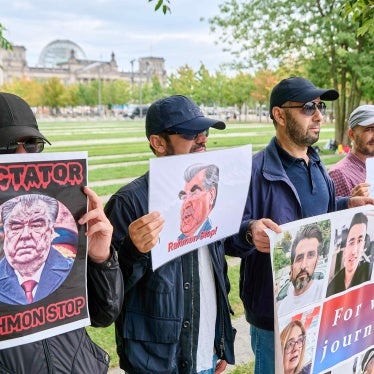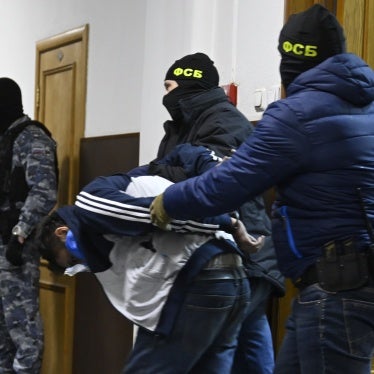Since the “Rose Revolution” that brought a new government to power in 2003, the Georgian authorities have failed to end widespread torture of detainees in the criminal justice system, Human Rights Watch said in a briefing paper released today.
“The government hasn’t adequately grappled with torture,” said Rachel Denber, acting director of the Europe and Central Asia division at Human Rights Watch. “There are few direct measures the government should take that could produce results in the short term.”
The 27-page briefing paper, “Georgia: Uncertain Torture Reform” describes the ongoing impunity for torture, a problem that persists despite some government measures taken to combat it.
The briefing paper documents how the new government’s campaigns against corruption and organized crime led to new allegations of due process violations, including torture and ill-treatment. It also details the measures the government has taken to combat torture. These include outside monitoring of police stations and steps to improve police professionalism, particularly in the collection of evidence.
The briefing paper details several cases of torture, including cases that highlighted problems associated with the new plea-bargaining system that the current government enacted last year. Law enforcement officials used the plea-bargaining system to cover up allegations of torture, promising lower penalties to defendants who agreed to the officials' version of events, which did not include the allegations of police abuse. Officials asked for monetary payments in exchange for releasing the defendant from custody.
“The government has taken some positive steps to prevent torture, but the plea-bargaining system is not one of them,” said Denber. “Especially in a country where the rule of law has not yet been firmly established, a system that allows law enforcement authorities the power to negotiate liberty in exchange for cash payments is bound to be abused.”
Human Rights Watch also documented cases where the government suspended investigations into torture allegations due to lack of evidence identifying the perpetrators of torture. However, when a person is detained, the authorities are supposed to keep records that identify which law enforcement officers are present when a detainee is interrogated or held in custody.
Human Rights Watch called on the Georgian government to ensure that individuals who make plea bargains in Georgia do not compromise their ability to bring claims of abuse, torture or other mistreatment and to pursue redress. Human Rights Watch further called on the government to take specific steps to ensure that law enforcement officers who commit torture can be identified. The government must ensure that law enforcement officials keep proper records of who is present during interrogation, and ensure that officials wear identifying badges.
Human Rights Watch found that there were hundreds of allegations of police torture in 2004—after the new government came to power in November 2003—but few cases of torture have been prosecuted. Officials told Human Rights Watch that by late 2004 the authorities had begun to prosecute law enforcement officers for torture.
However, according to the government’s own statistics, only 39 cases “involving elements of inhuman and degrading treatment” were investigated in 2004, out of which 20 were suspended or terminated, and only 12 were sent on to court. Out of the five cases that had been ruled on by a court by the time the statistics were gathered, only one police officer had been sentenced to an active prison term. In this case, the police officer was accused of beating another police officer and not a detainee, making it a dubious case of torture.
Human Rights Watch called on the European Union to set benchmarks for torture prevention in Georgia. Specifically, the European Union should urge the Georgian parliament to reform the procuracy, the body that is responsible for both prosecution and protection of detainees’ rights, and to ensure that policing and judicial tasks are performed by separate bodies that are fully independent of each other.








